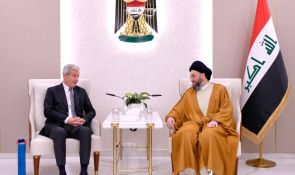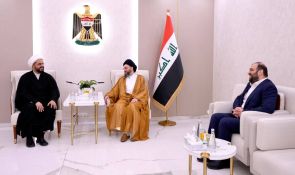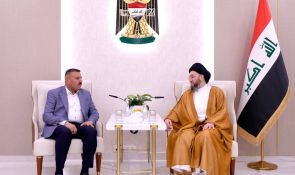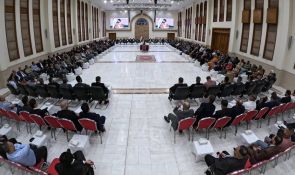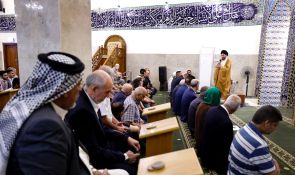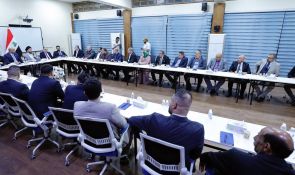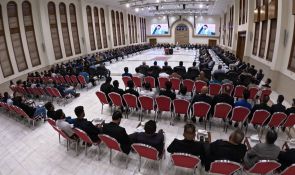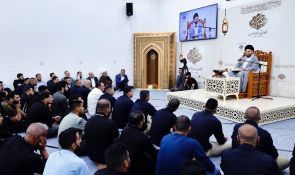Sayyid Ammar al-Hakim: “The religious authority is a redline. Defending it is a patriotic and Shari’a-mandated duty.”
Marji’iyya prevented bloodshed, united the citizens
We witnessed in the few past days unfortunate and painful events in the targeting of agents, endorsed representatives and offices of the religious Marji’iyya (highest religious authority) a strange and odd phenomenon in our society which never took place before despite the tough circumstances through which Iraq passed. This requires a serious stance and a review of such actions. It also requires looking for the entities that stand behind them.
What is noticeable is that the religious Marji’iyya, represented by imam Sayyid al-Sistani and his supporters, is charged with abusing others and of burning other offices, as we monitored such talks. This Marji’iyya, which prevented bloodshed and united the citizens of the Iraqi people, has for so long called everyone to let the law be the arbiter, to resort to the courts for retribution against any abuser or oppressor who oppressed this citizen or that and not start affecting justice against the abusers.
In 2003 and later years, the Marji’iyya always proved that it was keen about Islam and Iraq, defending the rights of the Iraqis. Now this Marji’iyya is being accused of doing illegal things, of abusing offices and quarters of groups here or there. This calls for deep regret about these charges and the way of dealing with the religious Marji’iyya.
We denounce such manifestations, such erroneous behavior, and we call on everyone to seek the judgment of logic and reason, to adhere to the law, to the dialogue, and to continue communicating with whoever you think has abused you in order to clarify the positions and put an end to such seditions and problems in our southern governorates and the beloved capital, Baghdad.
I also remind the brave security services of their duties and patriotic responsibilities in safeguarding lives and possessions and in monitoring such a phenomenon in order to get to know who stands behind these seditions and who abuses people, who disturbs the social ladder in our respectful governorates.
The prestige, religious and social status of our Marji’iyya is a redline the crossing of which we do not permit. We have to make a true stance in defending the religious Marji’iyya when it is exposed to such targeting of its quarters, offices, agents and endorsed representatives in several Iraqi governorates.
This Marji’iyya has stood and supported Iraq, defending Islam not just today but during a lengthy history since a thousand years and till our present day. It has played major roles in uniting and bringing people together, solving their problems, tackling their concerns and calling for tolerance among people via the right means. This Marji’iyya was the safety valve and the haven for disputants and contenders when they differed then returned to it to solve their problems and resolve their differences. It is the first to defend the deprived and the downtrodden no matter what their trends and affiliations may be. The charges which were launched as we heard at the religious Marji’iyya are not credible. The Marji’iyya and the institution of the scientific hawza (theological seminary) are being targeted. We have to stand and defend this Marji’iyya. We must defend its prestige and defend scholars of whom we are proud and defend the big achievements which have been made and which will be made at its hands.
We will stand and defend the Marji’iyya strongly and not permit anyone to tarnish its image under any circumstance, label or address here or there. This is our patriotic and Shari’a-mandated responsibility, and we shall adhere to it. If this or that has problems or a vision, he must resort to dialogue and to discuss such confusion so it may disappear.
Expected Arab Summit Ceilings
We are approaching the convening of the Arab Summit in Baghdad in the shade of a broad positive response by most sisterly Arab countries. We auger this response well, and it is an event that is worthy of a great deal of interest because it carries in its folds a big message for all Iraqis.
The holding of this summit in Baghdad has a big moral impact. It restores for Iraq its pivotal historic and shining role in the reality of the Arab network and in the global reality, and it opens the opportunity and stretches bridges for the return of the Arab brothers and for the return of positive dealing with the Iraqi reality.
At the time when we hope that this summit will achieve a great success and be held at the highest level of representation of the Arab leaders, we at the same time and in the shade of these critical circumstances through which the Arab world is passing and in this sensitive phase of our nation’s history realize the extent of the standing junctions, differences and complexities. This prompts us to look with political realism and to build ceilings for our expectations out of this summit on the basis of this confused reality and these intricate complexities. Therefore, we must not have high expectations of this summit. Rather, we look realistically at the nature of the standing circumstances and complexities in the Arab world.
We also hope that the respectful government and specialized authorities will exert maximum effort for the success of this summit in its most glaring portraits so it may achieve the big anticipated messages. We hope that it will represent a new supporting pillar and score another success to be added to the successes which were achieved by the respectful government and the fledgling political system in Iraq in the recent decade.
Iraq presiding over the League of Arab States for one full year will permit Iraq to play a positive and constructive role in communicating with the Arab brothers and in solving problems and assisting in the removal of obstacles which we nowadays witness in the Arab world and in carrying the Iraqi experiment to the Arab brothers, particularly the willing countries and the peoples that have undertaken a transformation process and look forward to benefit from the Iraqi experiment in building its new experiments.
GOVERNORATE COUNCIL LAW 21 AND AMENDMENTS
Talk goes on about activating Law 21 for the governorate councils and about introducing amendments that provide it with greater opportunities and broader powers so the governorate councils may carry out their duties and responsibilities towards the citizens. It is a step in the right direction although it is late, but it is better than not coming at all or the governorate councils continuing to suffer from shortcomings in powers and areas.
We know that this law is yet to be activated. This defective law, which did not adhere to the constitutional powers granted to governorate councils and which provided the governorate councils with less powers than was provided by the law to the provincial governor during the monarchy. This prompted the council of the presidency, when the law was legislated, to veto it. It was vetoed by Dr. Adil Abdul-Mahdi during that time because it contradicted the constitution. And it does not award the governorates the constitutional powers stated for this council. But even this faulty law was not activated till now. There are many complaints from the governorates in this regard, and we hope we will see a diligent movement and a true trend in the direction of the powers as endorsed by the Iraqi constitution.
The federal government is concerned about strategic plans that benefit all governorates and the country in general. But the plans relevant to the governorates are linked to governorate councils and to the local governments. The federal government is concerned about the strategic and sovereignty plans, and anything else has to be sent to governorate councils. But what is really regretful is that the recent amendments which were said to be expanding the powers of governorate councils came to bite and to take another portion of these defective powers, minimizing them. This places all of us before a big responsibility to defend the constitution and the constitutional powers of local governments and governorate councils.
Arguing about centralism and non-centralism, which stirred many personal opinions among the political forces in Iraq, was settled by the constitution when Iraq was regarded as a federal country. In it, powers have to be awarded to the provinces and governroates. Granting full powers to the governorates will lighten the burden of the federal government and facilitate for this government to fulfill its duties towards the citizens. On the other hand, it will contribute to providing better and faster services to the citizens in various governorates which is a necessity in the present phase.
The modern governmental administrative systems and successful global experiments in our present world depend on non-centralism, on giving broad powers to the governorates, provinces, boroughs and other such labels in this country or that. So, we have to benefit from these experiments and go forward in the best way that enables us to achieve social prosperity for the citizens and provides speed in offering services to our countrymen.
Non-centralism is not the guarantee for safeguarding the prestige of the state as some people imagine. What guarantees this prestige for the state is the citizens’ pleasure with its performance, with providing services for these citizens in the appropriate and suitable way. Therefore, the more we go towards non-centralism and broadened the powers, whenever we provide better and faster services for our countrymen, the more the state restores its prestige in a greater way, assuming its place in the hearts of the citizens.
Non-centralism will to a great extent help the existing administrative and bureaucratic routine in the ministries. Hardly any transaction is done without a very hard effort. But when the tasks are vested on the governorates, when the citizen goes to the governorate council and to the offices in that governorate rather than citizens’ transactions are sent to Baghdad, these problems will be tackled quickly. This is an important step in solving people’s problems. Also, non-centralism will contribute to minimizing the corruption phenomenon.
A local government sits to make decisions, and the citizens in the governorate are familiar with the projects, whether these projects are executed in the wrong way. This process is done as people see and hear when they refer to the governorate council, and to the governor, and remonstrate with him about any shortcoming or procrastination, or whether he did well, so they would thank him.
Social monitoring will then be greater and easier when the powers are in the hand of the governorate council. But when the projects are carried out in the governorate by the ministries that sign contracts with the companies and contractors, whenever a citizen complains, it is said to him that such and such ministry is responsible, and the governorate council has nothing to do with it. Here, the citizen cannot monitor these matters. Therefore, going towards non-centralism and granting powers to the governorates will minimize the phenomena of administrative and financial corruption in the state. Also, non-centralism contributes to increasing the self-confidence of the officials, and the citizens will feel that they are responsible for building their governorate. The governorates will compete with each other. People look at what the local government in this governorate or that did or at the right experiments that are propagated from one governorate to another. The official himself feels that he is in a position where he has to make decision and bear the responsibility for them and that he must make matters succeed. Ultimately, there is no room for him except to benefit from the competences, minds and energies so his projects may succeed, and so he may succeed before people. Also, when the citizen grants his trust in a number of officials and places them in the governorate council and local government, he keeps monitoring, eying their performance as the elections approach. If they do well, he will renew his trust in them and thank them. If they fare badly, he will punish them and give his vote to one who can change this program. It grants confidence in the official. It makes the relationship between the official and the citizen strong, having no gap, having no indifference, and this is a very important matter. Also, extreme centralism will prompt many governorates to undertake hasty decisions for forming provinces, decisions which may not be at the suitable time, and the citizens of the governorate may bear its negative repercussions, and the country as a whole may be pushed towards their negative consequences. In the end, we will have missed our chance for cementing, for cohesion, for crossing this sensitive and critical phase.
Administrative centralism and granting full constitutional powers to the governorate councils represents a big step towards building and developing the Iraqi governorates. It will to a great extent participate in the true economic and social building of the new Iraq and will meet the Iraqi citizen’s expectations from the respectful government. For these reasons, we demand considering this issue as a basic one. We want the ladies and gentlemen who are members in the council of representatives to bear a big responsibility in amending this law bill which is submitted before their eyes so it may be in harmony with the constitution and with the broad constitutional powers.
BURNING COPIES OF THE QUR’AN: A SHAMEFUL AND WRONG BEHAVIOR
We received with a great deal of regret the report about a number of copies of the Holy Qur’an being burnt at an American military base in Afghanistan. What does it mean to target and burn copies of the Holy Qur’an like that? Targeting the Qur’an is targeting the sanctities. Any targeting of others’ sanctities represented in such way is shameful and wrong. We have to disseminate the spirit of tolerance, to accept the other, to recognize the other. Islam represents a great reality in our present world. Assaulting the Muslims’ holies and abusing the Muslims’ faith and sanctities represents a state of close-mindedness which is not in harmony with all the theses that talk about disseminating tolerance, peace and accord. What grudge and what hatred is this that prompts an American soldier to burn these holy Qur’ans at some base in Afghanistan or in a base somewhere else in the world? This is grudge and animosity. This means that we did not give him, nor did his country give, the right education that enables him to deal with others in a subjective spirit and with respect. If you differ with a Muslim, it is your privilege. And the Muslim has the right to differ from you when it comes to faith. But respecting the Muslims’ faith and holies is your obligation, ours and everyone else’s. so, an end has to be put for such norms of conduct, and this requires a big effort on the educational level so this hatred among the peoples and nations may go away and on the level of measures that prevent such abuses. There is no room for coexistence among the religions and nations except by disseminating tolerance, dialogue, acceptance of the other even if we differ with him in an issue here or there.
“EMO”: A FOREIGN PHENONEMON TO THE IRAQI SOCIETY
Strange social phenomena have started surfacing in our Iraqi society that are distant from the customs, traditions, religious and ethical constants in which our society believes. These phenomena spread among the youths and teenagers from both genders such as the “emo” and others. The strange clothes, haircuts, the placing of tattoos on bodies in an inappropriate and unsuitable way, the use of rings and necklaces and the like with pictures or having skulls and the like… may all be phenomena that are distant from our customs, traditions and values, and they harm our society and jeopardize it. These phenomena represent the extent of the cultural and “moral” invasion to which our Iraqi society, Arab and Islamic societies in general, is exposed. They represent the suitable environment for taking drugs, to violate the law, to commit sins and certain moral corruption in order to spread ideologies that are intruders on our pristine Arab and Iraqi culture. They represent the absence of the social security. Just as we need security to stand in the face of the terrorists, our society, in its cultural dimension and immunity, in its ideology, also needs security monitoring of another type: cultural security.
Society’s security nowadays is facing a shock in our reality when such phenomena and such behavior among our dear and respectful youths spread. They represent a wrong understanding of technology, freedom, openness, etc. We support development. We support modernization. We support openness, and we support freedom, but these concepts have limitations and frames within which they must be regulated. They in other countries, where such phenomena are created, have concepts, frameworks, restrictions and conditions; so, how can they be in Iraq without conditions or restrictions?
From the position of social and moral responsibility, I direct my plea to the pristine Iraqi families, to the news media and to the concerned civil society organizations to monitor these social issues. I direct my plea to them and call them to beware of such phenomena and to put together the needed treatments for them, to study the reasons behind these phenomena and to tackle them appropriately not by force but by ideology, education and sound measures because they have destructive effects on our social structure.
DIVORCE… SCARY NUMBERS
Statistics also point out to a scary increase in the number of divorces in Iraq, especially among the youths, in such a genuine Arab and Islamic country such as Iraq. It is a phenomenon that includes all Iraqi governorates without any exception according to these statistics. It is not a phenomenon that is centered in an area rather than another. This is an Iraqi phenomenon by all standards and considerations, and it reveals the presence of leniency in studying marriage offers when this marriage tie is formed: When the daughter is sought for marriage, swiftly comes the answer with a “Yes” and it becomes a marriage process. O wife, O groom! Look deeply at who you want to marry. O bride! Go and see if this husband suits you in his education, conduct, performance and resources. O families! Help the youths identify the right person who suits the boy and the girl so the marital relationship may be successful and sound rather than one or two or six months later, the wife finds out that it does not suit her, and the husband finds out that his choice was wrong and he cannot come to an understanding with her, so they go to get a divorce. This is wrong. This phenomenon also reveals that the role of grown-ups is now less in our families and societies. During old times, when there was a problem, the most senior comes to meet with the couple and the problem is looked into and resolved. They encourage each other to bypass these problems and that is there any family at all where no problem takes place here or there?
Ironing is the last medicine, and the most hated permissible act is divorce. The first choice must be good. This, too, is one of our problems. This phenomenon also reveals the existence of weakness in affinity, in love, in sentiments, in the human relations between the married couple. As soon as an issue takes place over which there is a dispute, divorce happens. This means that there is no sufficient affection and harmony. We need to disseminate the culture of staying in touch, of commending the visiting of those of our kith and kin, of love inside the family. The wife loves the husband and the husband loves the wife. Through these feelings of affection and love can we stand before some of these inconveniences. It also points out that the citizens’ living reality and our society’s financial situation can bear a direct impact on such serious and sensitive phenomena.
This phenomenon will mean that we are facing serious symptoms in our society. It includes the birth of generations of children who will lose the care of one of their parents: He may be either with the father, so he loses the love of the mother, or he may be with the mother, so he loses the care of the father. A generation of children will thus be created who are distant from the status of balance and psychological stability. What is anticipated and wanted is a very serious matter; therefore, I call on all those who are keen and who are concerned in the State’s institutions and in the society in its various areas to study this phenomenon, its roots and causes and the needed solutions to face it and to minimize such phenomena which harm our reality and social structure.
GLOBAL DAY FOR SOCIAL JUSTICE
On the 20th of February, we live through the International Day for Social Justice. It is an important opportunity to support the global effort for eradicating poverty and expanding work opportunities for the unemployed, for achieving social prosperity in our human societies, for paying attention to woman and granting her more roles and opportunities in order to achieve a status of justice and equity between man and woman, and so their roles may complement each other in building the society.
Social justice represents a basic principle for peaceful coexistence in the societies. What coexistence and peace can ever be built separately from justice among the people and away from providing the opportunities that are suitable for honorable living? Social justice requires us to rise above our differences and encroachments, and that we must accept the other opinion and trends, to remove the psychological barriers between peoples and recognize the blessing of difference if it is based on a racial, religious, ethnic or cultural background.
We invest this opportunity to call on those concerned in our beloved country, Iraq, to pay attention to the poor and downtrodden segments, to work towards minimizing the differences among them, against the class distinction among our citizens, so there will be no rich class and a poor one. Rather, everyone must have a fair opportunity to live in dignity, pride, and in a work opportunity and to have more such things. We demand our dear politicians not to flood the country with crises so the poor individual becomes the victim. We do not want the poor to become the firewood of the contenders in these standing struggles and political disputes.
MOTHER TONGUE DAY: A CALL FOR INTEREST IN ARABIC
The 21st of February is the international day for the original languages, the mother tongues of the world, and it is an opportunity to show interest in this linguistic diversity. Each language means culture. The existence of many languages means multiple cultures. Language is the one that safeguards the heritage and protects the cultural reality of peoples and nations; so, we have to pay attention to this culture and to these many languages, what we can derive from the diversity and plurality of cultures. There is no room except for respecting these many languages that contribute to a great extent to disseminating understanding, tolerance and dialogue among the peoples and nations.
I invest this opportunity to remind you of the importance of and need for expressing an interest in Arabic. Little interest is there in it, in its restrictions, good clarity and flowing styles. We also have to adopt openness on the other languages in our country such as Turkish, Turkmen, Syriac and all languages in Iraq. We regret the low level of interest in Arabic language due to preference of foreign languages in many of our good Arab countries. There must be a return to the mother tongue. There must be interest in this language which represents interest in our genuine Arab culture.


